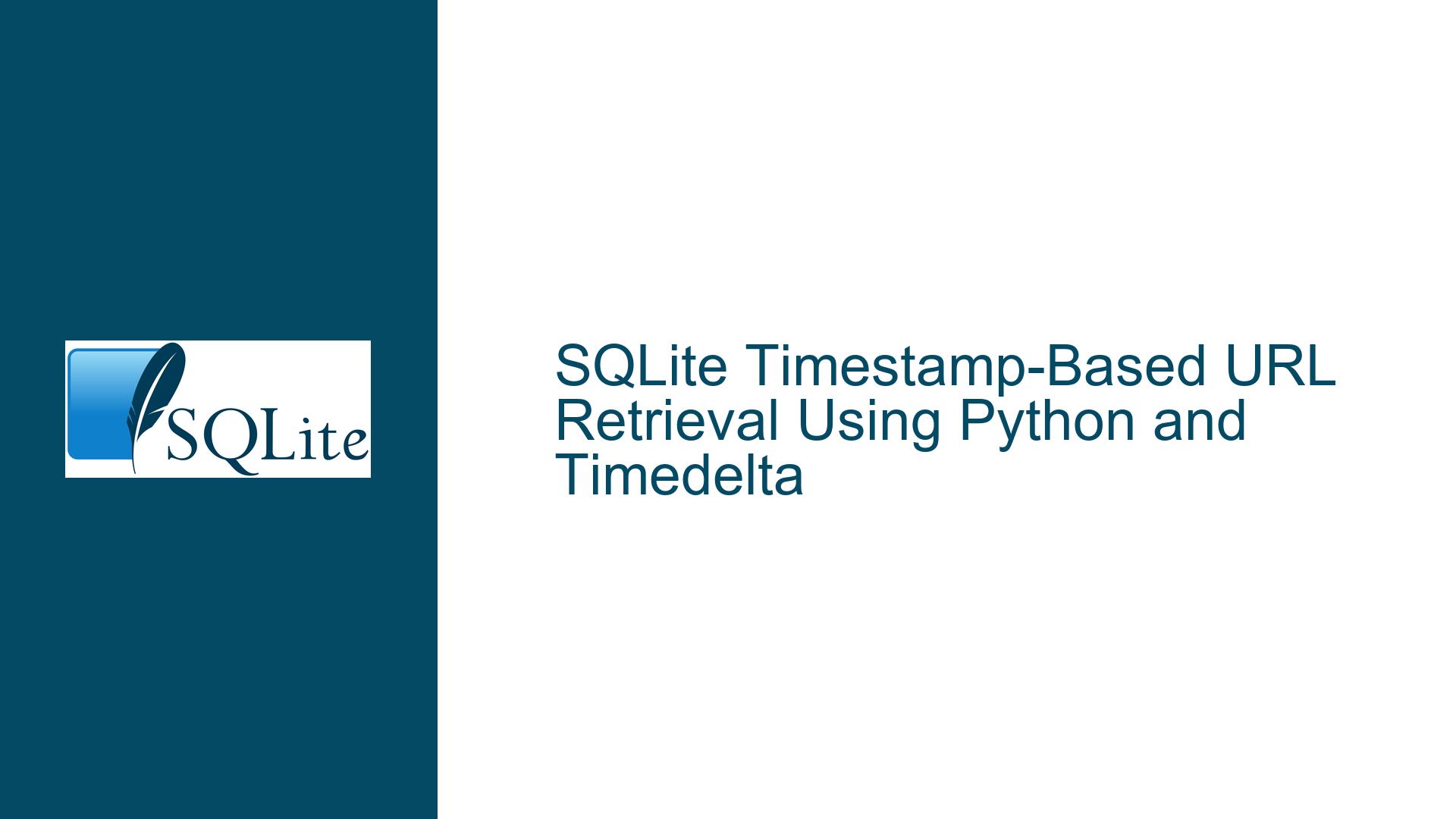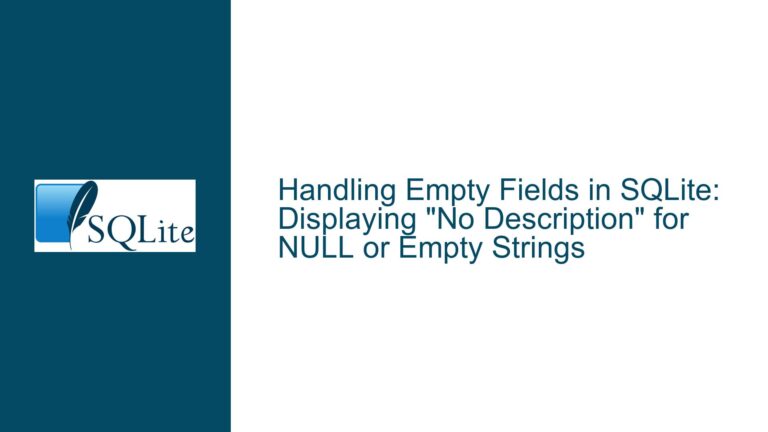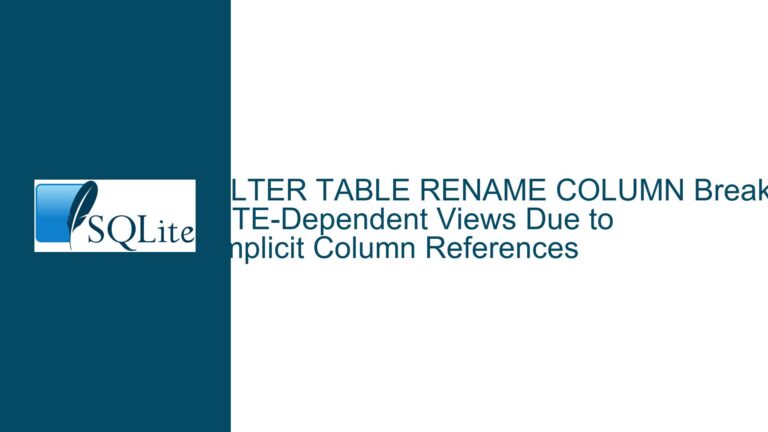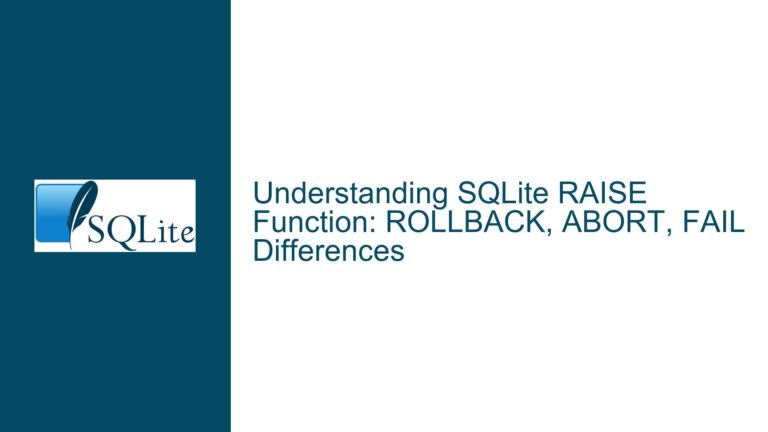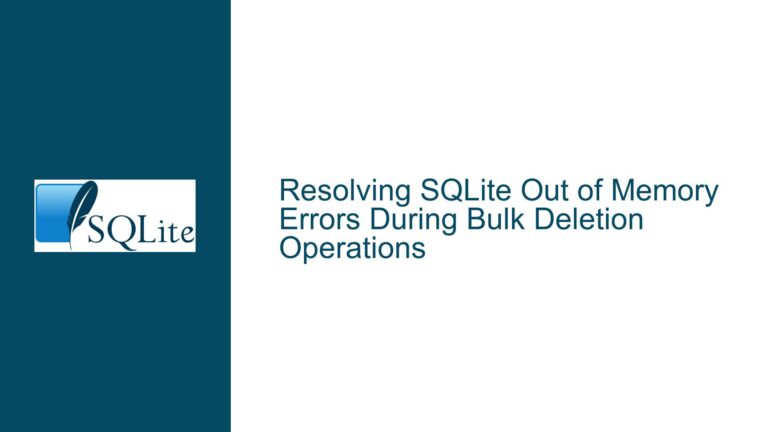SQLite Timestamp-Based URL Retrieval Using Python and Timedelta
SQLite Query Fails to Retrieve URLs Based on Timestamp Range
When working with SQLite databases, a common task is retrieving records based on timestamp ranges. In this scenario, the goal is to fetch URLs from a table named donedeal_listings where the timestamp column falls within a specific time range defined by a timedelta of one hour. The initial approach involved using Python’s datetime and timedelta modules to calculate the time range and then executing an SQL query to retrieve the URLs. However, the query consistently returned an empty list, despite the absence of any errors.
The core issue lies in the way the SQL query is constructed and executed. Specifically, the query attempts to use string literals "past_time2" and "past_time" directly within the SQL statement, which are not recognized as Python variables. This results in SQLite interpreting these literals as column names or string values, leading to an empty result set. The problem is further compounded by SQLite’s lenient handling of quotes, which allows the query to execute without syntax errors but fails to produce the intended results.
To understand the issue more deeply, consider the following Python code snippet:
timenow = datetime.now()
delta = timedelta(minutes=0)
delta2 = timedelta(minutes=5)
prevtime = timenow - delta
prevtime2 = timenow - delta2
past_time = prevtime.strftime('%Y-%m-%d %H:%M:%S')
past_time2 = prevtime2.strftime('%Y-%m-%d %H:%M:%S')
conn = sqlite3.connect('ddother.db')
c = conn.cursor()
c.execute('SELECT adUrl FROM donedeal_listings WHERE timestamp BETWEEN "past_time2" AND "past_time"')
all_urls = c.fetchall()
print(all_urls)
conn.commit()
In this code, past_time and past_time2 are Python variables holding formatted datetime strings. However, when these variables are embedded directly within the SQL query string, they are treated as literal strings rather than being interpreted as the values they hold. This misinterpretation is the root cause of the empty result set.
Misinterpretation of String Literals in SQL Queries
The primary cause of the issue is the incorrect handling of Python variables within the SQL query string. When the query is constructed as follows:
c.execute('SELECT adUrl FROM donedeal_listings WHERE timestamp BETWEEN "past_time2" AND "past_time"')
SQLite interprets "past_time2" and "past_time" as either column names or string literals, depending on the context. Since these literals do not match any column names in the donedeal_listings table, SQLite defaults to treating them as string values. This results in a query that effectively looks for timestamps between the strings "past_time2" and "past_time", which is not the intended behavior.
Another contributing factor is SQLite’s flexible handling of quotes. Unlike some other databases, SQLite does not enforce strict rules around quoting, which means that it will not raise an error if a quoted identifier does not correspond to an existing column name. Instead, it will silently treat the identifier as a string literal, leading to unexpected query results.
To illustrate this, consider the following modified query:
c.execute('SELECT "past_time2", "past_time"')
This query returns [('past_time2', 'past_time')], demonstrating that SQLite is interpreting the quoted terms as string literals rather than as references to Python variables. This behavior confirms that the issue lies in the way the query string is constructed and executed.
Correcting the Query with Parameter Binding
The solution to this problem involves using parameter binding to correctly pass the Python variables past_time and past_time2 into the SQL query. Parameter binding ensures that the values of these variables are properly interpreted by SQLite, rather than being treated as string literals.
The corrected query should be written as follows:
c.execute("SELECT adUrl FROM donedeal_listings WHERE timestamp BETWEEN ? AND ?;", (past_time2, past_time))
In this revised query, the ? placeholders are used to indicate where the Python variables should be inserted. The second argument to c.execute() is a tuple containing the values of past_time2 and past_time, which are passed to the query in the correct order. This approach ensures that SQLite interprets the values correctly and retrieves the URLs within the specified timestamp range.
To further clarify, consider the following table that outlines the differences between the incorrect and correct approaches:
| Approach | Query Construction | Result |
|---|---|---|
| Incorrect | c.execute('SELECT adUrl FROM donedeal_listings WHERE timestamp BETWEEN "past_time2" AND "past_time"') | Empty result set due to misinterpretation of string literals |
| Correct | c.execute("SELECT adUrl FROM donedeal_listings WHERE timestamp BETWEEN ? AND ?;", (past_time2, past_time)) | Correctly retrieves URLs within the specified timestamp range |
By using parameter binding, the query is both more secure and more reliable. It prevents SQL injection attacks and ensures that the values are correctly interpreted by SQLite. Additionally, this approach is more maintainable, as it separates the SQL logic from the data, making the code easier to read and debug.
In summary, the key to resolving this issue lies in understanding how SQLite interprets quoted terms within queries and using parameter binding to correctly pass Python variables into the SQL statement. This approach not only fixes the immediate problem but also sets a foundation for writing more robust and secure database queries in the future.
